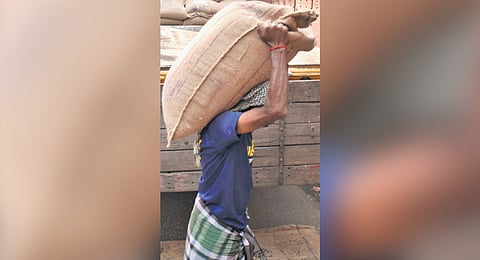

CHENNAI: The Tamil Nadu government has turned down the union government’s directive to distribute three months’ entitlement of rice and wheat in advance to NFSA (National Food Security Act) cardholders.
In May, the Union Food department had asked Tamil Nadu and other states to supply food grains for June, July, and August at one go to NFSA beneficiaries. It had directed the Food Corporation of India (FCI) to coordinate with the state government for advance lifting and distribution.
The centre attributed the decision to the need to avoid losses due to adverse weather conditions and other factors.
The directive from the Deputy Director of the Statistics division, Department of Food and Public Distribution, advised states to lift food grains in advance and ensure immediate distribution, citing the upcoming monsoon season and the anticipated logistical and storage challenges caused by adverse weather conditions such as floods.
Sources from the FCI told TNIE that while the state government initially agreed to lift food grains in advance from the FCI, it later decided against the move. A few states, including Odisha and Madhya Pradesh, have already distributed three months’ worth of rice at one go to beneficiaries. According to union government guidelines, the FCI is required to maintain sufficient food grain stocks to meet six months’ demand.
The proposed advance lifting is expected to enhance rice storage capacity and help minimise storage losses at warehouses.
However, the Tamil Nadu Civil Supplies and Consumer Protection department has raised several practical challenges in implementing bulk distribution. It has informed the centre that the existing system of monthly distribution will continue for now.
An official explained, “Antyodaya Anna Yojana (AAY) cardholders are entitled to 35 kg of rice per month. Distributing 105 kg at one time would pose serious logistical difficulties for beneficiaries in transporting such large quantities. Moreover, most ration shops are too small to store three months’ worth of stock.”
He further noted that many ration shops operate with only two rooms – one for billing and biometric authentication, and the other for issuing commodities.
“Since the Point of Sale (POS) machines are integrated with weighing scales, the sales personnel must press a button on the POS while weighing the items. With many shops staffed by only one person handling both billing and distribution, managing three months’ supply in a single go is not feasible,” he said.
The official added that if the state government launched a home delivery of food grains for select beneficiaries, such initiatives can be implemented in future.Tamil Nadu has a population of 3.6 crore covered under the NFSA through 1.12 crore ration cards.
This includes 93 lakh Priority Household (PHH) cards and 18.45 lakh AAY cards. PHH cardholders are entitled to 5 kg of rice per person, with a maximum of 20 kg for a five-member family, while AAY cardholders receive 35 kg of rice per month. On average, the state receives 2.02 lakh metric tonnes of rice each month for distribution under NFSA.
Fact file
3.6 crore Total population covered under National Food Security Act
18.45 lakh PHH-AAY
93 lakh Ration cards: PHH
A total of 1.12 crore ration cards are issued to the poorest of poor people, vulnerable and other economically weaker sections
PHH card holders are eligible for 5 kg
per member, if it’s single member 12 kg
AAY cards are eligible for 35 kg per month
Bottlenecks
Cardholders won’t be able to carry huge quantity of rice
Limited storage space at ration shops
The scheme cannot be implemented at ration shops manned by single member
FCI is required to maintain sufficient food grain stocks to meet six months’ demand
The advance lifting is expected to enhance rice storage capacity & help minimise storage losses at warehouses